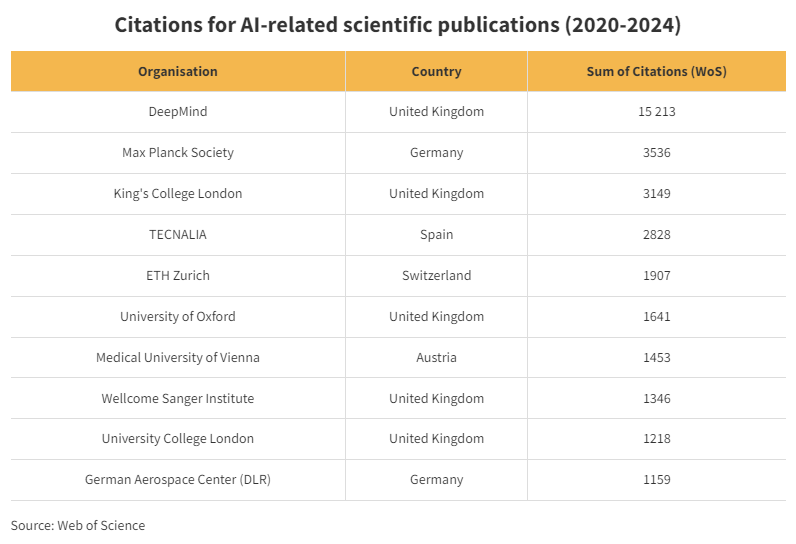The ranking of the most highly cited papers by researchers in Europe puts DeepMind first, followed by Max Planck and King’s College London

Photo credits: Supatman / BigStock
In the citation race, nobody comes close to DeepMind in Europe. The brains behind Gemini, one of the leading AI chatbots on the web, are the most-cited European authors over the last five years. According to Web of Science data, DeepMind-led articles published between 2020 and 2024 have been cited 15,213 times.
That is more than the combined number of references to papers published by researchers at the next seven European institutions. Following the London-based company are the Max Planck Society in Germany and King’s College London, with 3,000+ citations each in the field, an analysis of the Web of Science data shows.
An eye on healthcare
DeepMind’s dominance is mainly due to the 2021 article ‘Highly accurate protein structure prediction with AlphaFold’, in which DeepMind said it had solved a 50-year grand challenge in biology, developing an algorithm that can predict the 3D structure of a protein from its amino acid sequence.
AlphaFold DB, an open source database run in partnership by Deepmind and the European Molecular Biology Laboratory’s European Bioinformatics Institute in Cambridge, was initially trained on over 170,000 proteins. The main authors of the paper were awarded the Breakthrough Prize in Life Sciences. The database now contains almost every protein sequence in Uniprot, the universal protein resource and the international standard reference, another database also curated by EMBL.
Proteins were also the subject of Max Planck’s most cited AI article, published in 2022. ‘ColabFold: making protein folding accessible to all’, which builds on AlphaFold data. The King’s College London paper is also health-focused, addressing with the effects of Long COVID.
In the top-10 cited organisations, the Medical University of Vienna and the Wellcome Sanger Institute in Cambridge also feature.
In the overall ranking, the second-most cited paper is by researchers at Tecnalia, a research and technology development centre in San Sebastian, Spain, which has almost 2,900 references for ‘Explainable Artificial Intelligence: Concepts, taxonomies, opportunities and challenges toward responsible AI’.

UK-Germany duopoly
Overall, papers authored by researchers in the UK and Germany have more citations combined than any other countries in Europe, at 29,000 and 13,000 respectively. Spain comes in third, mainly due to Tecnalia’s work, followed by the Netherlands and Switzerland. These two countries are led by Radboud University Nijmegen and ETH Zurich. At the bottom of the list are Romania, Cyprus, and Poland, with a combined total of 663 first-authorship citations.
While China is the global leader in AI publications in absolute numbers, among the 1,255 most cited and Europe-led articles, Chinese co-authors only appear 125 times. Collaboration with US-based partners is not much higher: only 312 of the analysed papers have a US-based co-author.
Read more about publications and other AI-related data in the upcoming Science|Business report on AI – including leading authors, topics, and funding data





 A unique international forum for public research organisations and companies to connect their external engagement with strategic interests around their R&D system.
A unique international forum for public research organisations and companies to connect their external engagement with strategic interests around their R&D system.